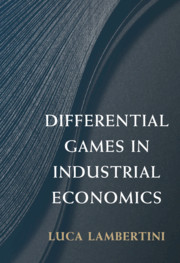8 - International Trade
Published online by Cambridge University Press: 29 March 2018
Summary
The economic theory of international trade has taken a well-defined strategic flavour in its modern version, which is known as the new trade theory. Its building blocks are monopolistic competition, consumers’ preference for variety and increasing returns to scale, but also the strategic behaviour characteristic of oligopoly theory has acquired almost immediately a considerable role in it, as testified by the volumes of Helpman and Krugman (1985, 1989), Grossman (1992), and the survey in Brander (1995), to mention only a few reference works.
This chapter offers a compact overview of relevant contributions applying differential game theory to the analysis of problems either directly connected with the dynamic translations of classical themes in trade theory, such as the optimal design of trade policies including tariffs and voluntary restraints (Section 8.1), or to issues falling in the area of environmental and resource economics with an eye to capture the impact of trade strategies and policies on the quality of the environment and the preservations of resource stocks, as well as a synthetic portray of the interaction between trade, resource exploitation and global warming (Section 8.2).
Trade and Trade Policies
This section is a survey of differential games in which the subject is the design and impact of different trade policies either in three-country models where firms export towards a third market or in two-country models where intraindustry trade takes place between them. The basic layout used in the ensuing models can be seen as a differential game version of the Cournot models with trade dating back to Brander (1981) and Brander and Krugman (1983).
Sticky Prices, Once Again
The differential game literature on the choice between import tariffs and export subsidies revisits a discussion whose building blocks are in Brander and Spencer (1985) and Eaton and Grossman (1986). Not surprisingly, all of the initial debate (Dockner and Haug, 1990,1991; Driskill and McCafferty, 1996) relies on modified versions of the Cournot sticky price oligopoly game of Simaan and Takayama (1978) and Fershtman and Kamien (1987).
Without following the chronological order of appearance, I will set out with the summary of the analysis carried out by Driskill and McCafferty (1996), who use the sticky price game to describe a classical situation in international trade theory.
- Type
- Chapter
- Information
- Differential Games in Industrial Economics , pp. 212 - 233Publisher: Cambridge University PressPrint publication year: 2018



